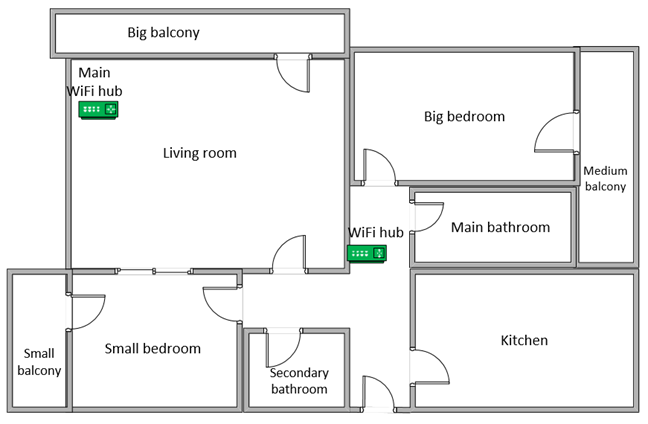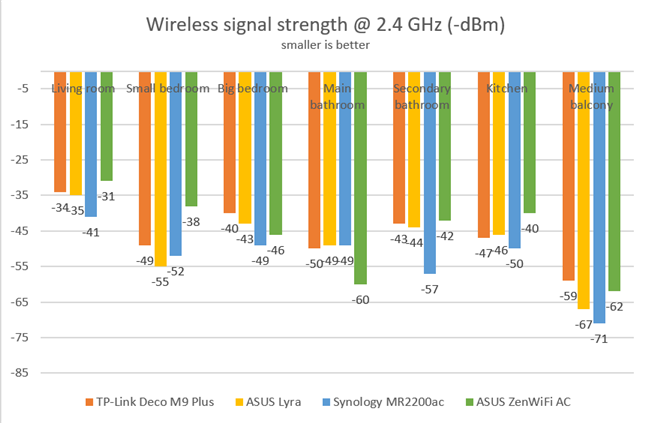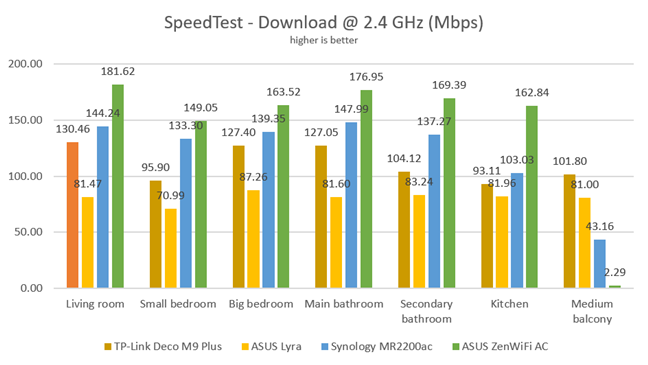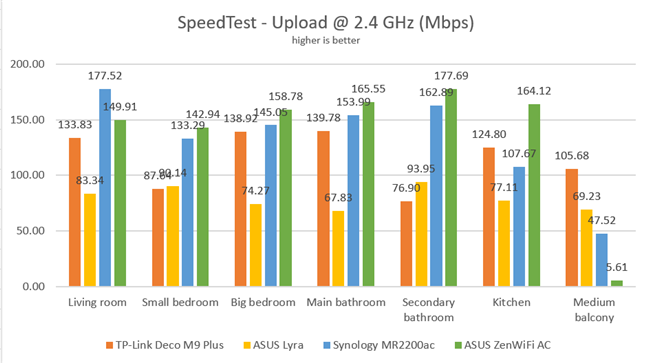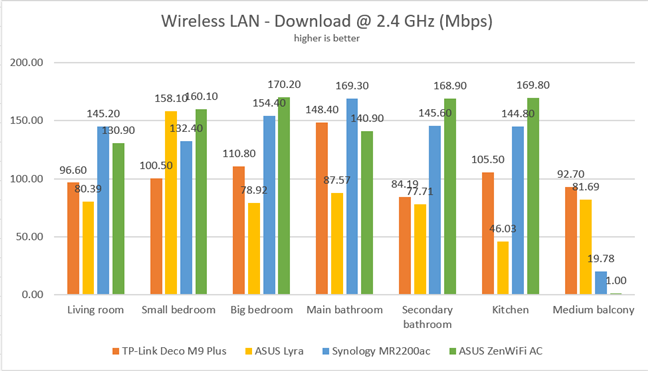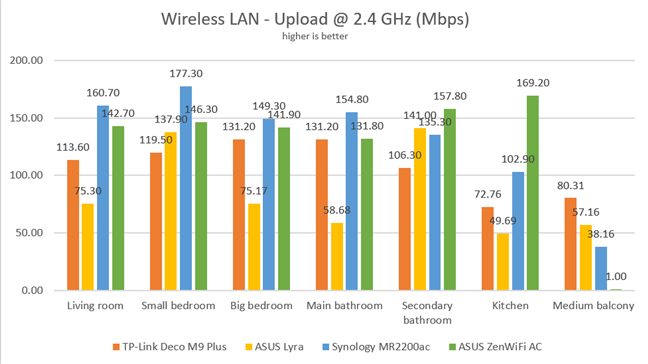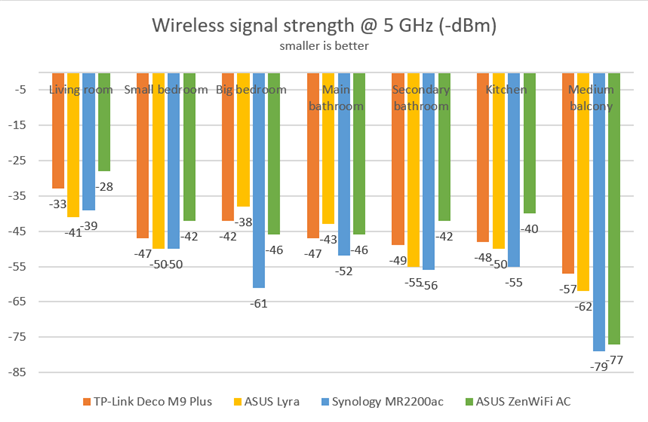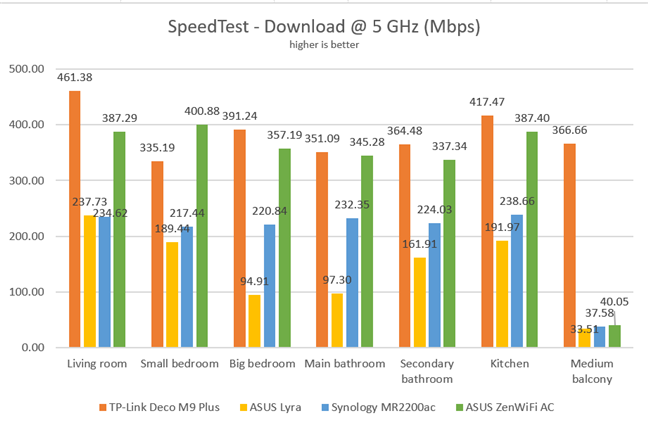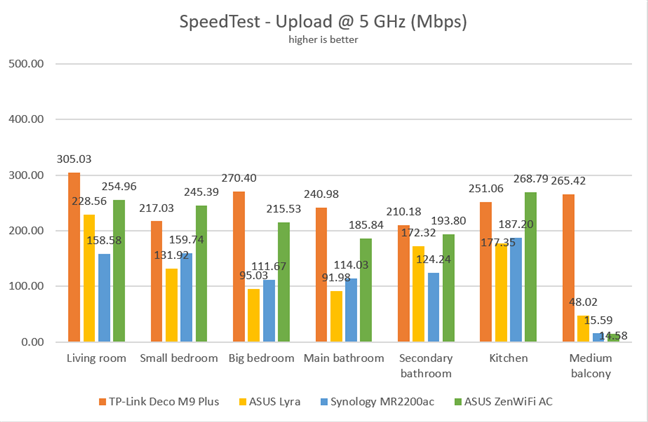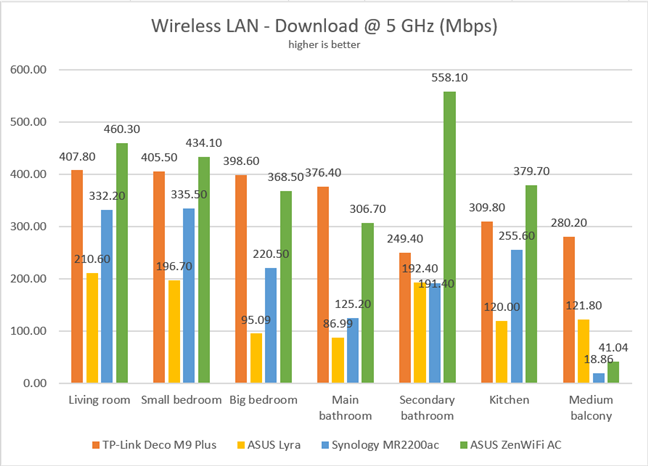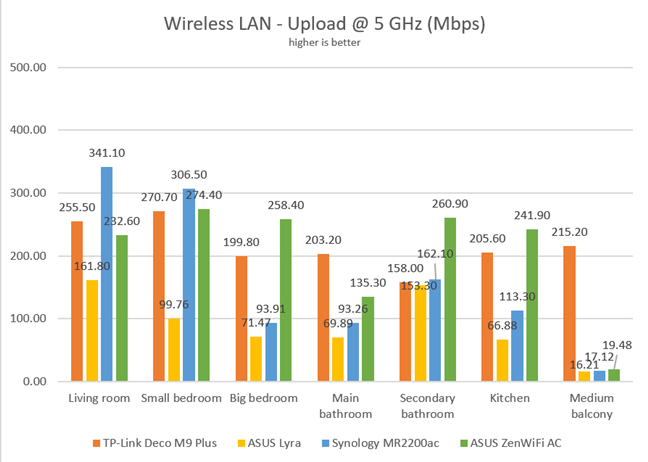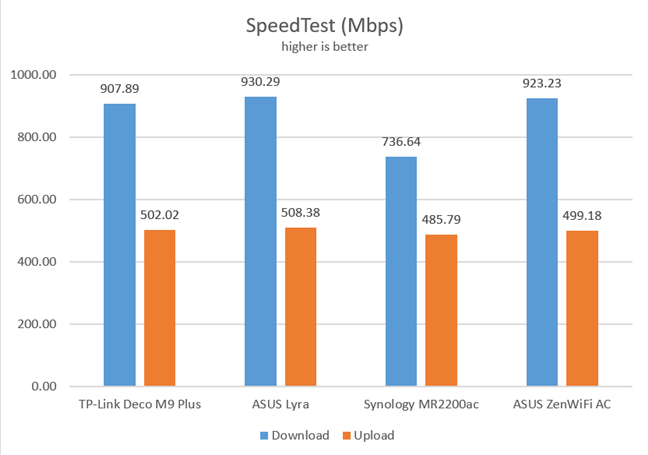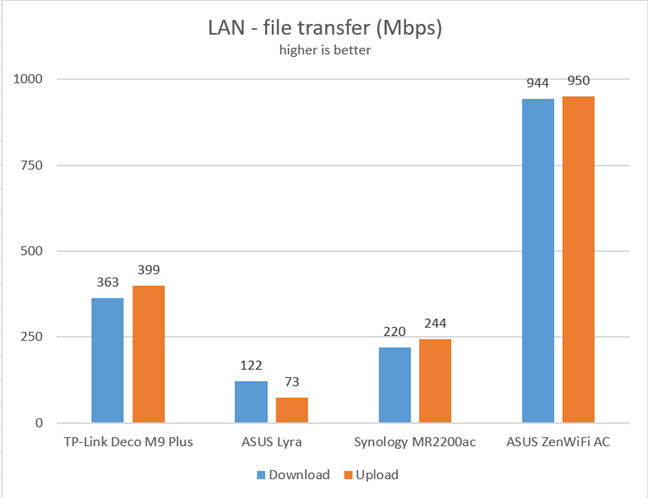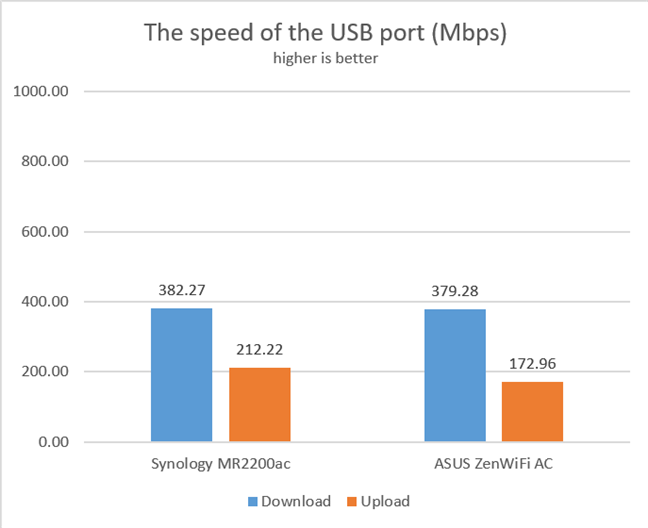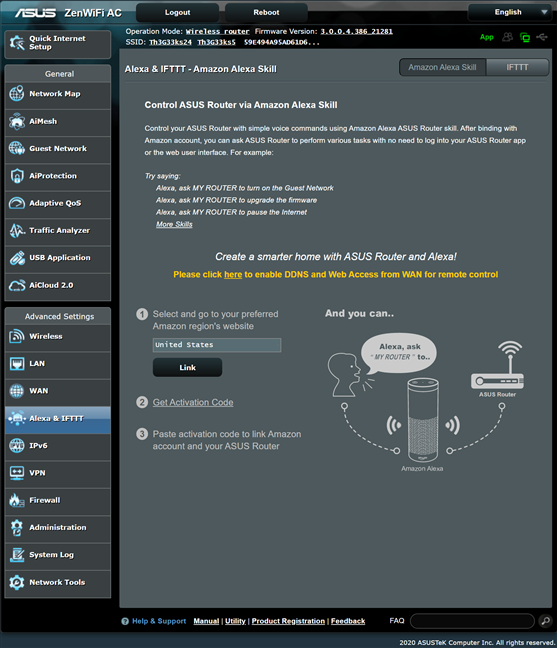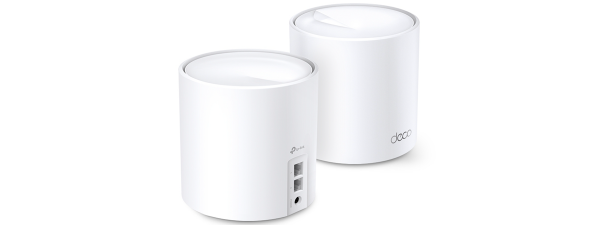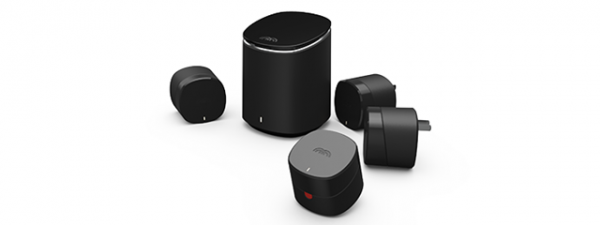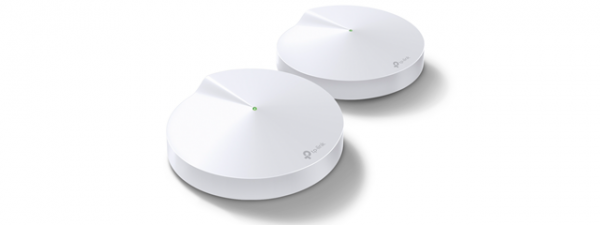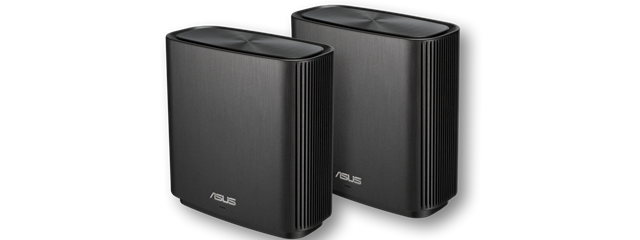
Wireless network performance
Let's look at the apartment that was used in our testing and how it is set up. You can see that the main ASUS ZenWiFi AC (CT8) is placed in the living room. To improve the coverage of the network, we placed the ZenWiFi AC (CT8) station in the hallway, close to the entrance to the kitchen. Our testing was done using a fast 1 Gigabit Internet connection that is capable of uploads on the internet of up to 500 Mbps. We used an HP Spectre 13 laptop for all our measurements and several software tools.
To get a better idea of the performance offered by ASUS ZenWiFi AC (CT8), we compared it with TP-Link Deco M9 Plus, ASUS Lyra, and Synology MR2200ac.
We started by evaluating the 2.4 GHz wireless network and measured the signal strength offered in each room using a tool named NetSpot Pro. As you can see below, ASUS ZenWiFi AC (CT8) offered great signal strength in almost all rooms.
Then, we used SpeedTest to see how fast the internet connection is when using the 2.4 GHz wireless frequency. Except for the room farthest from the main station, ASUS ZenWiFi AC (CT8) delivered excellent download speed everywhere, beating both the competition and its predecessor - ASUS Lyra - with ease.
The upload speed was excellent in all rooms, except the one farthest from the main station.
For the next measurements, we used the PassMark Performance test to transfer data between two computers connected to the network, using the 2.4 GHz wireless frequency. In some rooms, ASUS ZenWiFi AC (CT8) offered the fastest downloads, while in others it performed similarly to the competition.
The upload speed was excellent too, in all rooms, except for the one farthest from the main station.
On the 2.4 GHz wireless frequency, ASUS ZenWiFi AC (CT8) offers excellent performance, that is similar to or better than that of its competition.
Next, we analyzed the performance offered by the 5GHz wireless network. We started by looking at the evolution of the signal strength. In many rooms, ASUS ZenWiFi AC (CT8) had a higher signal strength than the mesh Wi-Fi systems we compared it to.
We then ran SpeedTest to see how fast the internet connection is on the 5GHz band. ASUS ZenWiFi AC (CT8) offered fast downloads in all the rooms of our test apartment, except the one farthest from the main station.
Upload speeds were fast, as you can see below.
For the last measurements on the 5GHz wireless network, we used the PassMark Performance test to transfer data between two computers connected to the network. ASUS ZenWiFi AC (CT8) was the speed champion in many rooms.
The upload speed offered by ASUS ZenWiFi AC (CT8) was excellent in all rooms, except for the one farthest from the main station.
On the 5 GHz wireless frequency, ASUS ZenWiFi AC (CT8) offers impressive speeds, both for the download and upload.
Wired network performance
To test the quality of the wired Ethernet connection, we used a desktop PC, and we measured the speed of the internet connection when using a 1 Gbps Ethernet cable using SpeedTest. In this test, ASUS ZenWiFi AC (CT8) reached the maximum potential of our internet connection.
We ran a network transfer between the two computers, both connected with an Ethernet cable to the main station. We ran data transfers between them, using PassMark Performance test. ASUS ZenWiFi AC (CT8) reached speeds close to 1 Gbps, as promised in its specifications.
The other mesh Wi-Fi systems deliver lower speeds because they do not have enough ports to connect two desktop computers to the same station. Therefore, the network transfers were mediated through Wi-Fi.
USB performance
We connected a portable SSD to the USB port of the ASUS ZenWiFi AC (CT8). We then transferred data between a desktop PC and the SSD. As you can see below, the USB 3.0 port on the ASUS ZenWiFi AC (CT8) is reasonably fast. Except for the Synology MR2200ac, the other mesh Wi-Fi systems did not have a USB port so that we could compare speeds.
Unlike many mesh Wi-Fi systems, ASUS ZenWiFi AC (CT8) does have a USB 3.0 port that is reasonably fast.
Extra features
The ASUS ZenWiFi AC3000 whole-home mesh Wi-Fi system bundles many advanced features:
- A comprehensive Router Security Assessment tool that verifies whether your settings are secure. When it finds problems, it proactively informs you and takes you where you need to be to fix things.
- Malicious Sites Blocking - an efficient cloud-based antivirus that blocks malicious websites on all the devices connected to your network.
- Two-Way IPS - a two-way intrusion prevention system that protects your network from spam, DDoS attacks, network attacks, and more. It also scans the packets that are sent from your network to the internet.
- Infected Device Prevention and Blocking - if your network devices get infected, and they become zombies in malware networks, they are automatically blocked, and you are informed about this problem.
- Parental Controls - useful, cloud-based parental controls that parents can use to set rules about internet access for their children's devices.
- Adaptive QoS - an advanced Quality of Service feature that can be used to optimize network traffic, including but not limited to online gaming.
- Guest Network - you can enable up to three wireless networks for each band, with individual security and access settings.
- Traffic Analyzer - visual traffic statistics that give you a clear picture of how your network is used and by which devices.
- USB Applications - apps that are designed to work with the devices that you connect to the mesh Wi-Fi using USB: external hard disks, printers, and 3G or 4G dongles or modems. You also have a Download Manager that you can use to set your AiMesh to download stuff from the internet to an external hard disk that's connected to it.
- AiCloud 2.0 - a mobile app that keeps you connected to your data wherever and whenever you have an Internet connection. With it, you can access the folders shared in your home network from your Android or iOS smartphone or via a personalized URL
- IPv6 - support for IPv6 addresses that are going to replace IPv4.
- VPN - you can set the AiMesh system to work as a VPN server, and you can also use it to turn your network-connected devices into VPN-enabled clients, without additional VPN software required.
- Network Tools - for analyzing the network and identifying what's wrong. They are useful when you need to troubleshoot problems.
- Dual WAN - excellent for both small businesses and professionals who require always-on internet connections. You can also use a dual WAN to improve the quality of your internet connection and get the best possible performance.
- DDNS - a service that allows you to connect to the AiMesh from the internet, even if your internet provider gives you a dynamic public IP address.
- Integration with Amazon's Alexa voice assistant and IFTT (If This, Then That) - you can automate tasks that might otherwise be repetitive or unable to "talk to each other." With the help of these services, you can say things like "Alexa, ask ASUS ROUTER to upgrade the firmware" or get an email when your child gets home and connects his or her smartphone to the home Wi-Fi.
What is your opinion about the ASUS ZenWiFi AC (CT8) mesh Wi-Fi system?
Now you know our opinion about the ASUS ZenWiFi AC3000 whole-home mesh Wi-Fi system, what we like, and do not like about it. Before closing this review, tell us your opinion about this product. Do you consider it a good choice? If you already have it, what was your experience with it? Comment below and let's discuss.


 17.01.2020
17.01.2020 